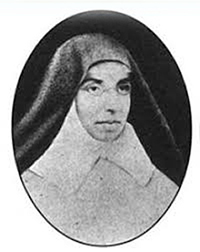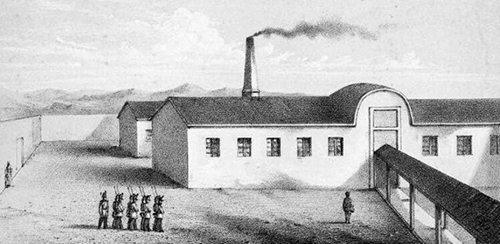The Sisters of Mercy
The Religious Sisters of Mercy are members of a religious institute of Catholic women founded in 1831 in Dublin, Ireland by Catherine McAuley (1778-1841). McAuley opened the first Convent of Mercy in England at Bermondsey, a district in southeast London, on November 19, 1839 for the education of children and the visitation of the poor, sick, and needy. Mother Mary Clare Moore was appointed Superior. When the London Times reported appalling conditions at the front, the British War Office issued an appeal for volunteer nurses. On October 14, 1854, Bishop Thomas Grant of the Borough of Southwark approached the Sisters of Mercy at Bermondsey seeking their assistance. The nuns of Bermondsey, responded to the call.

Sister Mary Clare Moore
The arrival of two groups of Irish Sisters of Mercy to assist with nursing duties at Scutari met with different responses from Nightingale. Mother Mary Clare Moore headed the first group from Bermondsey and placed herself and her Sisters under the authority of Nightingale. The two were to remain friends for the rest of their lives.
The second group from the Sisters of Mercy convent in Limerick, Ireland, headed by Mother Superior Mary Francis Bridgeman, met with a cooler reception as Nightingale had not been informed of their dispatch until they were already in transit and also because Bridgeman refused to relinquish authority over her Sisters to Nightingale. Sister Bridgeman did not trust Nightingale, whom she regarded as too ambitious. After Nightingale overcame her annoyance about Sister Bridgeman's group, she wrote a letter welcoming them and inviting just five of the Sisters to join her at Scutari Hospital but not as nurses. Bridgeman took the letter to mean that she and her Sisters were released from their agreement with the War Office to provide nursing services at Scutari. Upon arriving in the Crimea in late January 1855, Bridgeman arranged for her party to nurse at the Koulali General and Barrack Hospitals near Scutari.

Koulali General Hospital
Tensions also existed between Bridgeman and Mary Clare Moore. Each of the two had their own agenda. Moore was anxious to avoid being accused of attempting to convert wounded Protestant soldiers to Catholicism. Bridgeman could not understand how Moore could allow herself to be placed under the authority of Nightingale, a secular woman. Bridgeman believed that Nightingale had deliberately driven a wedge between the two groups of Sisters.
In October 1855 Dr. John Hall, Inspector-General of Hospitals in the Crimea, in a direct snub to Florence Nightingale, whom he did not like, appointed Bridgeman as Superintendent of the Balaclava General Hospital without consulting Nightingale. This only succeeded in exacerbating the tension which already existed between Nightingale and Bridgeman. Tensions would persist throughout the rest of the military campaign. Peace was only occasionally brokered between them by various hospital doctors and chaplains. As a result, Bridgeman and her Sisters were permitted to continue with their own style of nursing. In several letters, Nightingale referred to Bridgeman as Mrs. Bridgeman and Reverend Mother Brickbat.
When a cholera epidemic hit the Army in the Crimea, Bridgeman and her Sisters immediately responded. Having already had experience nursing cholera patients in their native Ireland, the Sisters began treating the sick as well as tending to the wounded and dying from the year-long Siege of Sebastopol. In the Crimea the Sisters introduced tried and tested systems of management and nursing care. Mother Mary Francis Bridgeman's journal states, "Miss N took notes on our manner of nursing, which I explained to her as she hoped someone might profit of it." It has been suggested that the system of management and nursing introduced by Bridgeman and her Sisters in the Crimea found their way, uncredited, into Nightingale's after war report to the War Office.
In April 1856, Nightingale regained control of Balaclava General Hospital and Bridgeman immediately resigned, giving as a reason that she and her Sisters were no longer required owing to the falling numbers of sick and wounded and the imminent declaration of peace. Peace was declared on April 2, 1856 and Bridgeman and the Sisters left the Crimea for England on May 12, sailing by way of Constantinople, Malta and Gibraltar. Arriving in England on May 8. 1856, they rested for a short period in London before returning to their various convents.
Following Nightingale's return to Great Britain and her campaign for better living conditions for the army, the Royal Commission on the Health of the Army was created. Nightingale prepared an 800-page report for the commission (including the uncredited input from Mother Bridgeman) on the welfare of the army. She advocated the use of statistics as a tool in decision making. Nightingale created graphs to demonstrate that more soldiers died in the Crimean War from disease than from wounds.
The Religious Sisters of Mercy are members of a religious institute of Catholic women founded in 1831 in Dublin, Ireland by Catherine McAuley (1778-1841). McAuley opened the first Convent of Mercy in England at Bermondsey, a district in southeast London, on November 19, 1839 for the education of children and the visitation of the poor, sick, and needy. Mother Mary Clare Moore was appointed Superior. When the London Times reported appalling conditions at the front, the British War Office issued an appeal for volunteer nurses. On October 14, 1854, Bishop Thomas Grant of the Borough of Southwark approached the Sisters of Mercy at Bermondsey seeking their assistance. The nuns of Bermondsey, responded to the call.

Sister Mary Clare Moore
The second group from the Sisters of Mercy convent in Limerick, Ireland, headed by Mother Superior Mary Francis Bridgeman, met with a cooler reception as Nightingale had not been informed of their dispatch until they were already in transit and also because Bridgeman refused to relinquish authority over her Sisters to Nightingale. Sister Bridgeman did not trust Nightingale, whom she regarded as too ambitious. After Nightingale overcame her annoyance about Sister Bridgeman's group, she wrote a letter welcoming them and inviting just five of the Sisters to join her at Scutari Hospital but not as nurses. Bridgeman took the letter to mean that she and her Sisters were released from their agreement with the War Office to provide nursing services at Scutari. Upon arriving in the Crimea in late January 1855, Bridgeman arranged for her party to nurse at the Koulali General and Barrack Hospitals near Scutari.

Koulali General Hospital
In October 1855 Dr. John Hall, Inspector-General of Hospitals in the Crimea, in a direct snub to Florence Nightingale, whom he did not like, appointed Bridgeman as Superintendent of the Balaclava General Hospital without consulting Nightingale. This only succeeded in exacerbating the tension which already existed between Nightingale and Bridgeman. Tensions would persist throughout the rest of the military campaign. Peace was only occasionally brokered between them by various hospital doctors and chaplains. As a result, Bridgeman and her Sisters were permitted to continue with their own style of nursing. In several letters, Nightingale referred to Bridgeman as Mrs. Bridgeman and Reverend Mother Brickbat.
When a cholera epidemic hit the Army in the Crimea, Bridgeman and her Sisters immediately responded. Having already had experience nursing cholera patients in their native Ireland, the Sisters began treating the sick as well as tending to the wounded and dying from the year-long Siege of Sebastopol. In the Crimea the Sisters introduced tried and tested systems of management and nursing care. Mother Mary Francis Bridgeman's journal states, "Miss N took notes on our manner of nursing, which I explained to her as she hoped someone might profit of it." It has been suggested that the system of management and nursing introduced by Bridgeman and her Sisters in the Crimea found their way, uncredited, into Nightingale's after war report to the War Office.
In April 1856, Nightingale regained control of Balaclava General Hospital and Bridgeman immediately resigned, giving as a reason that she and her Sisters were no longer required owing to the falling numbers of sick and wounded and the imminent declaration of peace. Peace was declared on April 2, 1856 and Bridgeman and the Sisters left the Crimea for England on May 12, sailing by way of Constantinople, Malta and Gibraltar. Arriving in England on May 8. 1856, they rested for a short period in London before returning to their various convents.
Following Nightingale's return to Great Britain and her campaign for better living conditions for the army, the Royal Commission on the Health of the Army was created. Nightingale prepared an 800-page report for the commission (including the uncredited input from Mother Bridgeman) on the welfare of the army. She advocated the use of statistics as a tool in decision making. Nightingale created graphs to demonstrate that more soldiers died in the Crimean War from disease than from wounds.
Website Maintained by Vaudezilla